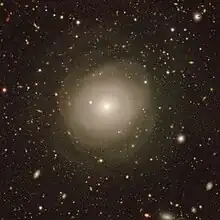| NGC 466 | |
|---|---|
 Legacy Survey DR 10 image of NGC 466 | |
| Observation data (J2000 epoch) | |
| Constellation | Tucana |
| Right ascension | 01h 17m 13.2s.[1] |
| Declination | −58° 54′ 36″[1] |
| Redshift | 0.017552/5262 km/s[1] |
| Distance | 227 million ly |
| Apparent magnitude (V) | 13.56[1] |
| Characteristics | |
| Type | SA0^+(rs) [1] |
| Apparent size (V) | 1.8' x 1.5'[1] |
| Other designations | |
| ESO 113-34, AM 0115-591, PGC 4632[1] | |
NGC 466 is a lenticular galaxy located about 227 million light-years away from Earth in the constellation Tucana.[2][3] NGC 466 was discovered by astronomer John Herschel on October 3, 1836.[4]
Group Membership
NGC 466 is a member of a group of galaxies known as GG 019.[5]
See also
References
- 1 2 3 4 5 6 7 "NASA/IPAC Extragalactic Database". Results for NGC 0466. Retrieved 2017-06-04.
- ↑ Rojas, Sebastián García. "Galaxy NGC 466 – Galaxy in Tucana Constellation · Deep Sky Objects Browser". DSO Browser. Archived from the original on 2017-10-02. Retrieved 2017-06-04.
- ↑ "Your NED Search Results". ned.ipac.caltech.edu. Retrieved 2017-06-04.
- ↑ "New General Catalog Objects: NGC 450 – 499". cseligman.com. Retrieved 2017-06-04.
- ↑ "Detailed Object Classifications". ned.ipac.caltech.edu. Retrieved 2017-10-01.
External links
Wikimedia Commons has media related to NGC 466.
- NGC 466 on WikiSky: DSS2, SDSS, GALEX, IRAS, Hydrogen α, X-Ray, Astrophoto, Sky Map, Articles and images
This article is issued from Wikipedia. The text is licensed under Creative Commons - Attribution - Sharealike. Additional terms may apply for the media files.